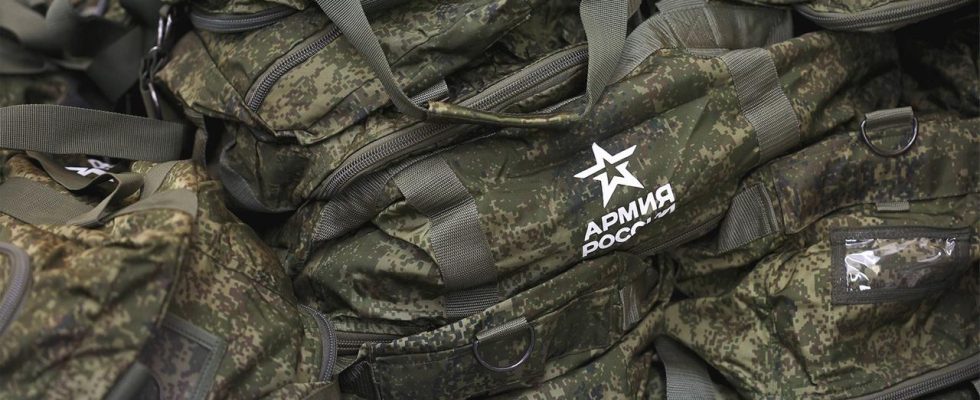Andrei Boldenkov doesn’t want to fight in Putin’s war. He flees to Germany, but does not receive asylum. The federal government had given hope to Russian conscientious objectors.
Federal Interior Minister Nancy Faeser had given hope to Russian soldiers who do not want to take part in Russia’s war of aggression against Ukraine: “If we have the chance to give those who turn away from Putin’s terrible war of aggression a temporary home, that is more than that appropriate,” she explained more than a year ago.
But statistics from the Federal Ministry of the Interior show that Russian conscientious objectors are not that welcome in Germany. Around 3,500 Russian men of military age have applied for asylum in the Federal Republic since the start of the war. So far only more than half of the applications have been decided. Only 92 men were granted protection.
The Bundestag voted against easier admission
After the so-called partial mobilization in Russia last autumn, many members of various parliamentary groups in the Bundestag spoke out in favor of making it easier to accept Russian conscientious objectors.
But a corresponding proposal from the left-wing faction in the Bundestag failed in the vote in September 2022. The New York Times just published figures according to which around 120,000 Russian soldiers have died in Ukraine so far. The numbers are based on estimates from US intelligence agencies.
Didn’t return from business trip
Andrei Boldenkov from St. Petersburg did not want to be among the fallen soldiers. He was on a business trip in Germany at the time of the partial mobilization. He is a packaging developer and also a reserve officer. He acquired the rank many years ago while studying at the university. This means it belongs to “Category I” in Russia. These are people who are called up first.
When he arrived at the airport with his colleagues for the return flight, he suddenly turned around and walked away. Instead of flying back, he applied for asylum in Germany. Taking part in the war of aggression against Ukraine is out of the question for him: “I don’t want to kill or die. And my country only gives me these two options.”
Threatened with deportation to Russia
Boldenkov now lives in a refugee accommodation in Upper Bavaria. He shares the room with three men. He himself sleeps on a couch. He quickly found work as a packaging developer and dreams of bringing his wife and daughters from St. Petersburg.
Two draft orders have now arrived there for him. But his application for asylum in Germany was rejected. “They list for 19 pages how dangerous it is in Russia. With the illogical conclusion to me that I have to go back there.” The decision states that he is asked to leave Germany within 30 days, otherwise he will be deported to Russia. Boldenkov is appealing this decision.
pressure in Russia
Even Federal Chancellor Olaf Scholz had spoken out in favor of accepting into Germany those Russians who do not want to take part in the war in Ukraine, which violates international law. “I am in favor of offering these people protection,” said the Chancellor in an interview with the “Neue Osnabrücker Zeitung”.
Justice Minister Marco Buschmann also tweeted last year: “Apparently many Russians are leaving their homeland: Anyone who hates Putin’s path and loves liberal democracy is welcome in Germany.”
High penalties threatened
Those drafted into Russia face heavy penalties if they do not want to fight. The closer you are to the front line, the higher the penalties: up to 15 years in prison. If a conscript does not come to the military authorities after being called up, he faces up to two years in prison. There were also cases in media reports where men were forcibly taken to the military authorities.
Anton Tron from Moscow also does not want to take part in Putin’s war of aggression. He was politically active in Russia and posted pictures of the destruction in Ukraine. In Moscow, his family received his draft notice.
A note was even hung in the hallway of his home that said he was an “immoral person” because he “refuses to mobilize.” And anyone who knows where Anton Tron is should contact the military authorities or the police. His family also received a police summons for “discrediting the Russian army.” You can get up to 15 years in prison for this in Russia. Conscientious objectors have a right to asylum
Tron now lives in Hamburg. If he went back to Russia, it was clear what would happen: “They will wrap you up, handcuff you and take you to the front. And behind you they will station machine gunners who will shoot you if you try to escape.”
Lawyer Julian Brockmann wants to prevent his client from being used for war crimes.
A decision has not yet been made on his asylum application. However, he is unsettled by the many rejections from other Russian conscientious objectors. That’s why he hired a lawyer to fight for his right to asylum in Germany.
No pressure to war crimes
His lawyer Julian Brockman explains that every state obviously has the right to “recruit soldiers for its army.” Objectors and deserters normally did not enjoy the right to asylum. But if the conflict to which soldiers are deployed violates international law, then no one can be forced to take part in a war that violates international law, “because then they themselves would be committing war crimes.”
The European Court of Justice had also decided in two rulings in 2015 and 2020 that anyone who, as a soldier, would most likely be involved in the commission of war crimes can be recognized as a refugee.

